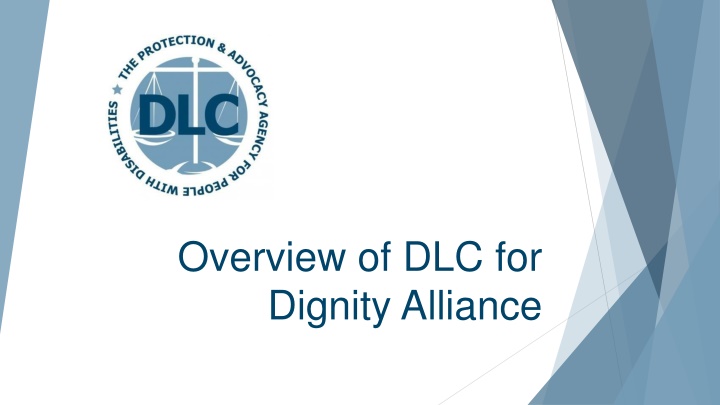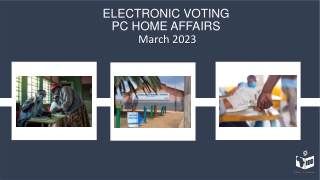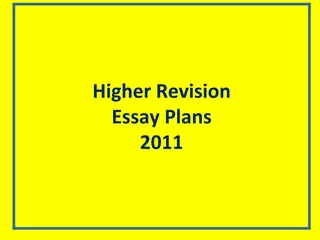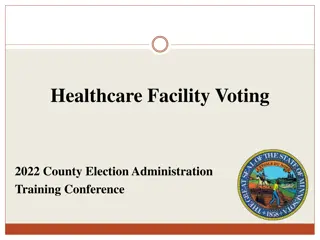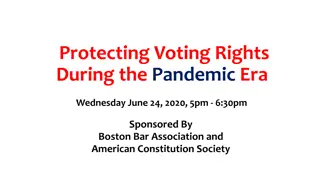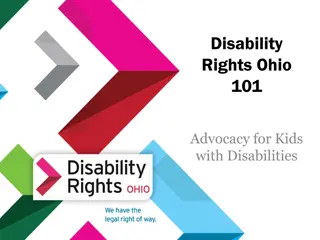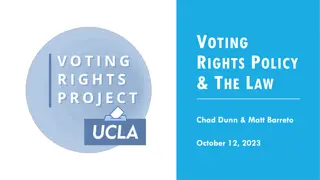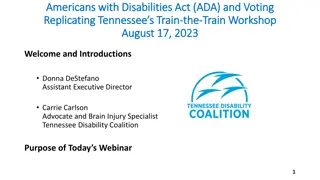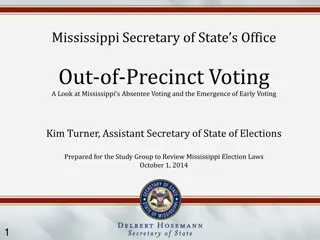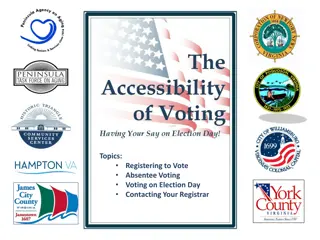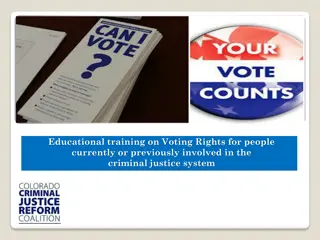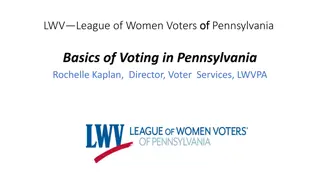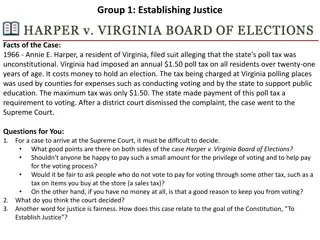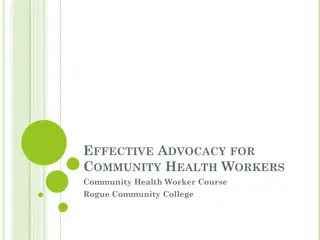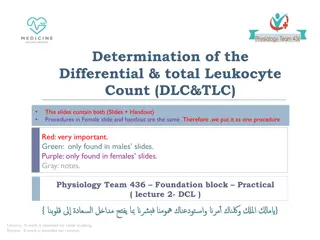DLC's Impactful Advocacy for Voting Rights & Disability Access
DLC's focus areas include core mission on abuse and neglect, litigation, and systemic advocacy. They have successfully secured accommodations for voters with disabilities to access vote-by-mail programs. Additionally, DLC is actively involved in litigation concerning accessibility for individuals with disabilities in various settings, such as state prisons.
Download Presentation

Please find below an Image/Link to download the presentation.
The content on the website is provided AS IS for your information and personal use only. It may not be sold, licensed, or shared on other websites without obtaining consent from the author.If you encounter any issues during the download, it is possible that the publisher has removed the file from their server.
You are allowed to download the files provided on this website for personal or commercial use, subject to the condition that they are used lawfully. All files are the property of their respective owners.
The content on the website is provided AS IS for your information and personal use only. It may not be sold, licensed, or shared on other websites without obtaining consent from the author.
E N D
Presentation Transcript
Overview of DLC for Dignity Alliance
DLCs Focus Areas concentrate on core P&A mission abuse and neglect DLC has been working incrementally each year to establish focus areas that center more on monitoring for abuse and neglect and investigating allegations of abuse and/or neglect. Group Homes and Day Programs Facilities state and private hospitals, nursing facilities, etc. Schools public and private DLC annually re-evaluates its Focus Areas to ensure they address the needs of the disability community.
DLCs Litigation and Systemic Advocacy
Accessible Electronic Voting Litigation and Systemic Voting Rights Advocacy From 2020 through 2022, DLC successfully prepared and litigated multiple court cases, conducted extensive legislative advocacy, and negotiated with the Secretary of the Commonwealth to secure voters with disabilities who cannot privately and independently access standard print vote by mail ballots accommodations to allow them to vote remotely using their personal assistive technology. The complete array of accommodations secured are as follows: electronic ballot marking, electronic return, and electronic certification by hand drawn signature or typewritten name for voters who cannot create or place a hand drawn signature due to vision or mobility/dexterity disabilities. With the passage of the VOTES Act in 2022, including the amendments that DLC fought to include that incorporate the accommodations DLC secured through litigation, Massachusetts established its permanent accessible vote by mail program, making Massachusetts' system among the most accessible in the entire United States. Thereafter, DLC got the Secretary of the Commonwealth to agree to provide the same accommodations to voters with disabilities participating in the emergency absentee voting program. DLC is monitoring implementation of these provisions and has joined the Election Modernization Steering Committee with Common Cause, MassVOTE, Massachusetts Voter Table, ACLU, League of Women Voters, Lawyers for Civil Rights, and MassPIRG to support a new election reform bill that includes bolstering requirements related to physical accessibility of polling sites.
Briggs v. Department of Correction Class action on behalf of Massachusetts state prisoners with hearings disabilities alleging ADA Title II and Constitutional Violations DLC, Prisoners Legal Services, Wilmer Hale, and the Washington Lawyers Committee for Civil Rights are litigating a case in federal district court against DOC based on its failure to provide accommodations necessary to allow individuals in DOC custody who are deaf or hard of hearing equal access to DOC programs, services, activities. The parties reached a broad settlement concerning a number of areas in 2019, but had a bench trial on the issue of accessible emergency alarms in 2023. Class counsel are awaiting the court s decision on the bench trial and DOC s opposition to our motion for a finding of substantial noncompliance with the settlement agreement.
Doe v. Parole Board Class action on behalf of incarcerated persons with mental disabilities in violation of ADA Title II (CONFIDENTIAL NOT YET FILED) DLC, Mental Health Legal Advisors Committee, and Prisoners Legal Services have filed a lawsuit in Superior Court in June 2023 against the Massachusetts Parole Board for failing to modify its policies and practices to meaningfully assess, consider, and accommodate the needs of individuals with disabilities. The case is a follow up to the Supreme Judicial Court s decision in Crowell v. Massachusetts Parole Board, 477 Mass. 106 (2017), which made clear that the ADA and the parole statute, M.G.L. c. 127, 130, require the Parole Board to make reasonable modifications to the hearing and decision-making process to provide persons with disabilities a meaningful opportunity to obtain parole.
Muehe, et al. v. City of Boston ADA Title II Class Action concerning access to Boston sidewalks and curb cuts After years of negotiations, DLC, Goldstein, Borgen, Dardarian & Ho, and the Civil Rights Education and Enforcement Center entered into a consent decree with the City of Boston approved by the federal district court to install or remediate accessible curb ramps for all corners of the City s Pedestrian Walkways, with minimum annual commitments for the next ten years of between 1,200 and 1,630 until the City reaches full saturation with every intersection having ADA compliant curb ramps. In November 2022, Plaintiffs and Boston prevailed in an appeal to the First Circuit Court of Appeals by a lone Objector to the class action settlement. The parties are now focused on implementation and monitoring of the consent decree.
LaBonte, et al. V. Six Flags New England ADA Title III Access Case This case concerns discrimination in a place of public accommodation by an amusement park against a child and his family. DLC and an attorney in private practice filed a case in federal district court in Springfield alleging that Six Flags New England discriminated against an 11- year-old boy with Spinal Muscular Atrophy Type II and his parents when the park refused to allow the child to use his physician-approved medical stroller in areas of the water park that have shallow standing water or sprinklers. After complaining and insisting that the park should reasonably modify their policies and procedures, the family s season passes were deactivated and refunded. We are currently in the expert discovery phase.
Taylor v. Springfield College Employment Discrimination in violation of ADA Title I DLC filed a lawsuit in federal district court alleging that Springfield College discriminated against our client, who had been a tenured professor until she was terminated while on a medical leave of absence due treatment and surgery related to her colorectal cancer. The lawsuit alleges that the college rigidly applied a six-month maximum medical leave policy in violation of the ADA, Section 504 of the Rehabilitation Act, and Massachusetts law, instead of extending her leave as a reasonable accommodation. The parties took part in unsuccessful mediation in early 2023 and are now actively engaged in discovery.
Examples of Other Systemic Advocacy Day Habilitation: DLC continues to work on the systemic problem of day habilitation programs not accepting back participants with higher support needs because of vacancies and the workforce crisis. Following discussions with state agencies and public records requests, DLC is preparing to take further action. Continuous Skilled Nursing (CSN): As part of larger systemic efforts to improve access to services for CSN members, DLC entered an appearance and filed an amended complaint in a pro se M.G.L. c. 30A appeal of MassHealth s decision to deny an 11-year-old child sufficient nursing hours to allow her to live at home with her mother and twin brother. The child currently lives in a pediatric nursing facility. After negotiations with EOHHS, the parties agreed to remand for new hearing before the Board of Hearings and plaintiff dismissed the appeal. DLC is preparing for the hearing in January 2024 and hope to successfully challenge the Community Case Management s scoring tool and assessment with expert support and get appropriate hours approved. Accessible MassHealth Notices: DLC is engaged in discussions with EOHHS to secure necessary accommodations to allow our MassHealth member clients, all of whom are blind, and other similarly situated MassHealth members, to access written notices routinely mailed by MassHealth and its contractors.
Recent Amicus Briefs Include: Commonwealth v. A.Z. DLC, with MHLAC, MAMH, and CPR, filed an amicus brief in October 2023 in a Supreme Judicial Court (SJC) case concerning the involuntary commitment to a state hospital of a first-time defendant for purposes of a competency evaluation, despite his requests to conduct in the evaluation outpatient, his lack of any prior criminal record, self-presentation at his arraignment pursuant to a summons, and no cash bail, among other factors weighing against denial of his liberty to conduct the evaluation. Argument was held November; we await the SJC s decision. Impounded Case re: the buildings and grounds restriction a court may order on an individual found not guilty by reason of mental illness, per M.G.L. c. 123, 16(e). DLC is currently collaborating with MHLAC and MAMH on another brief in an impounded case in which the SJC has issued a solicitation seeking amicus input on whether the statute violates due process and is unconstitutional the lack of a standard that the court must apply in determining whether an individual, once committed, should be restricted to the buildings and grounds Commonwealth v. Welch DLC is preparing an amicus brief concerning a trial court judge s decision to excuse a juror identified as autistic for cause based upon his presentation and a brief, concerning voir dire. U.S. Bank National Assn. v. Cherry DLC filed an amicus brief in July 2023 in the Massachusetts Appeals Court (MAC) concerning the court s failure to properly consider and issue written findings re: appellant's request for a continuance as an accommodation due to severe COVID-19 symptoms. The brief focuses on reinforcing Title II's application to access to courthouses and judicial proceedings and the requirements set forth in Adjartey v. Central Division of the Housing Court Department, 481 Mass. 830 (2019). Judge Rotenberg Education Center, et al. v. Commissioners of DDS and DEEC DLC and CPR filed an amicus in April 2023 brief representing various disability organizations in support of an appeal by the Commonwealth, in a case seeking to end the consent decree which limits the ability of the state to regulate aversive electrical shock used at JRC. In September 2023, the SJC affirmed the trial court s denial of a motion to terminate the consent decree permitting use of such aversives. Commonwealth v. Clinton, et al. DLC filed an amicus brief in the SJC Brief addressing liability of administrators as "caretakers" under M.G.L. c. 265, 13K (a) in matter brought to address administrator actions at the Holyoke Soldiers Home that gave rise to many tragic deaths. SJC issued its decision in April 2023, reversing the dismissals. The decision used language from DLC s brief (footnotes 11 and 13) in supporting its decision.
DLCs focus on core P&A mission of addressing abuse and neglect Utilizing our UNIQUE role and authority as the Massachusetts P&A System, which no other entity in the state possesses
Bridgewater State Hospital (BSH) Monitoring and Investigations DLC entered into a settlement agreement with Commonwealth following a P&A investigation in December 2014 concerning BSH's improper use of restraint and seclusion, resulting in DLC being settlement monitor for 2 years, along with partial state funding to be there 3 days per week; also monitoring parallel state court settlement in Prisoners Legal Services Minich suit. DLC's has maintained a continuing intensive presence on site since 2014, aside from a period of remote monitoring during the height of COVID-19 pandemic. Current activities focus on monitoring efforts pursuant to DLC's P&A authority and authority granted by a state legislative line item and investigations into staff uses of force on Persons Served. DLC issues public reports concerning our findings and recommendations twice a year. Our most recent report is available here. DLC contributes to complementary legislative efforts to change oversight from the Department of Correction to the Department of Mental Health.
Upcoming Reports Concerning Deaths of Individuals with Disabilities DLC released a public report in 2023 concerning our investigation into the death from cancer of a man involuntarily committed to Department of Mental Health Units in a Department of Public Health hospital, where his care did not meet the medical standard of care, per DLC's expert, and constituted neglect. DLC is preparing to release a public report about our investigation into the circumstances surrounding death of an 80-year-old state prisoner with dementia from severe complications of dehydration who was not receiving sufficient care or daily supports.
Use of Time Out Rooms in Schools DLC continues with policy advocacy related to use and overuse of timeout rooms in public schools, regularly meeting with the Department of Elementary and Secondary Education (DESE) and subject matter experts to help shape policy changes at the agency and conducting monitorings and investigations based on complaints we receive. As a result of DLC s work, including over 15 elementary school monitorings in which DLC photographed the conditions children face in time out rooms, DESE issued guidance in September 2021 to schools to reduce the use of time out and prevent abuse of time out rooms and other seclusion practices and a Master Agreement to assist schools and districts identify providers to assist with adopting alternatives to time-out rooms. These documents can be found here. DLC is still working intensively with DESE concerning necessary training for schools and new regulatory language consistent with the guidance.
Use of Antipsychotics in Long Term Care Facility Monitoring DLC has been employing monitoring of long-term care facilities and engagement with residents to inform systemic advocacy about issues overuse of psychiatric medication on residents. Analysis of resident records by DLC s expert has revealed disturbing practices indicative of systemwide issues related to intersection poor/inappropriate care and the workforce crisis. We have completed a report concerning our findings and recommendations that will be released in early 2024.
Emergency Shelter Practices Impacting Guests with Disabilities For several years, DLC has been engaged in a productive investigation into the one of Massachusetts' largest housing and emergency shelter providers focused on reforming the provider's policies and practices around reasonable accommodations, suspension of services (i.e., removal from shelter), emergency evacuations, and provision of trauma-informed services. While the investigation is nearing completion, DLC expects to be able to use the resulting written policies and practices as a model for other emergency shelters. To that end, DLC has initiated a monitoring project focusing on the Boston Public Health Commission emergency shelter sites.
Use of Restraint and Seclusion at Worcester Recovery Center and Hospital WRCH is a 320-bed inpatient Department of Mental Health facility serving adults and adolescents from all areas of Massachusetts. Along with other DMH- operated hospitals and mental health care units, DLC has maintained a regular monitoring presence at WRCH. As a result of information we have obtained through our monitoring, DLC has opened an investigation into the use of restraint and seclusion at WRCH, including whether current restraint practices are in compliance with DMH regulations. DLC has reviewed records and viewed videos of restraints and has brought concerns to the attention of WRCH administration. Some improvements have been implemented, and conversations are ongoing. DLC has also obtained WRCH records to track trends in the utilization of restraint and seclusion and whether race, ethnicity and/or primary language play a role in its use.
DLCs Legislative Advocacy
Legislative Advocacy 2023-2024 Wheelchair Warranty / Repair Bill Bill to Prevent DCF from taking SSA benefits of foster youth (90% of benefit amount, 500K/month or 5.5M per year) ER Boarding / Diversion Bill to Move Bridgewater from DOC to DMH Expanding Abuse Registry Bill to Include Day Hab CSN and Workforce Crisis legislation Expanding DDS adult eligibility Supported Decision-Making ADUs; Adaptable housing Remote access to public meetings Accessible Voting Opposing Outpatient Commitment Legislation State P&A Bill
Administrative Advocacy - Examples January 2023, Proposed DDS regulations on self- directed services; January 2022, RFI submission on DCF practices of taking SSA benefits of foster youth; October 2022 comments to regulations; related public records requests and negotiations with DCF; drafting public report. Jan. 2023 Public records requests re subminimum wage work and settings/policies related to Community Rule. Ongoing - legal research and fact investigation related to re-admission to day habilitation and discrimination against persons with higher support needs.
Administrative Advocacy - More Examples February 2023 Continuous skilled nursing regulations; ongoing collaboration on workforce crisis issues; Collaboration with other organizations in tracking rollout of the DMH Roadmap and efforts to divert people from boarding in EDs (pending admission to psychiatric units), and instead using community-based stabilization units, peer respites and other less restrictive alternatives. Timeout in Schools; Current negotiations with DESE Effective communication with hospitals, police and public entities
Comments to CMS HCBS State Plan Segregation in Residential, Day and Employment Programs January 2023 - Comments to new draft of State Transition Plan for CMS Community Rule. Two sets of DLC comments; One set of comments with CPR and other organizations; Sites for heightened scrutiny and group homes on former institutional grounds (GIS mapping and follow up monitoring); Movement of 1:1 "wrap" services off waiver to state plan; Lack of community participation; Need for protection from arbitrary eviction; Lack of integration in day and employment programs.
Monitoring and Investigations
Monitoring of DD Community Residences and Facilities (ICF-IDDs) Typical findings related to workforce crisis: staff vacancy rates; staff turnover; use of temp. or agency staff; issues with numbers of staff; relief staff training; community access; lack of community engagement; individual autonomy; Other recent monitoring visits included matters dealing with substandard conditions, sexual assault, medication errors and other human rights violations. Community Integration Tracking Tool; and data gathering on three measurements; Other issues: access to assistive technology; knowledge of DDS human rights system. Disability Advocates
Other Monitoring MassHealth Funded Day Habilitation programs (segregation; meaningful programming; workforce) DMH Hospitals (restraint and seclusion, medication, human rights, discharge advocacy) Private Hospitals (same) DMH Community Residences (human rights) Nursing Homes (abuse and neglect, workforce, overuse of anti- psychotics) TBI Facilities (same; NY residents) Schools (A&N; timeout rooms) Homeless Shelters (human rights, conditions, accommodations)
Investigations Other Public Reports Direct Support Professionals A Workforce Crisis Limiting Security, Human Rights, and Opportunity for People with Intellectual and Developmental Disabilities November 2021 DLC Finds Abuse & Neglect in Death of Woman Discharged from Middleborough Hospital and Left on Boston Streets June 2021 Notice of MCI-Shirley and MCI-Norfolk Investigations April 2020 MCI-Shirley and MCI-Norfolk Prison Investigations Interim Findings November 2020 DLC Investigation Report Concerning the Experience of Prisoners with Disabilities in Two Department of Correction Facilities March 2022 Notice of Lemuel Shattuck Hospital Investigation June 2020 Notice of Tewksbury Hospital Investigation June 2020
Monitoring and Investigations FY 2022 FY 2021 FY 2020 FY 2019 FY 2018 FY 2017 Places Monitored 78 99 125 105 112 61 Number of Investigations 33 26 30 28 32 15
DLCs Disability Benefits Project
Disability Benefits Project (DBP) Overview Since 1983 State Budget Line Item now MLAC funded Support Center on Social Security matters for DBP funded legal services advocates Core Work timely & high-quality support for DBP funded advocates But also answer questions from other legal services advocates, MLP advocates, pro bono attorneys, and a variety of others, including agency staff, social workers, medical personnel, legislators
DBP Core Work Respond to calls and email (listserv) from advocates (range from 800 900 per year) 6 substantive coalition meetings per year Case consults for merit and appeals Research and policy memoranda Review of memoranda and briefs Updates on policy, law and regulation changes Training legal and community
DBP Systemic Work Work with local advocates and SSA and local agencies on Social Security issues that arise Collaborate with local advocates to comment on regulation and policy changes Work with national group of advocates and SSA on issues and problems requiring a national response from SSA. Needed training for Social Security staff Social Security Rulings Case processing deficiencies SSI and SSDI work incentive policies and implementation
DLCs Representative Payee Program
Representative Payee Program (PABRP) Overview April 13, 2018 The Strengthening Protections for Social Security Beneficiaries Act was signed into law Provides mandatory grants by the SSA to each state's Protection and Advocacy System to conduct representative payee reviews Core Work Ensure Social Security benefits given to beneficiaries are used appropriately Also ensure health and safety of beneficiaries and provide additional referrals for community resource needs
DLCs Civil Legal Aid for Victims of Crime (CLAVC) Program
CLAVC Program Overview DLC provides a wide array of services to individuals with disabilities who have civil legal problems that are related to or impacted by their status as a victim or survivor of a crime. A DLC Staff Attorney, in connection with a DLC Supervising Attorney, provides information and referral, advice, and representation to CLAVC- eligible clients on issues related to housing, abuse prevention orders, employment, government services, healthcare, financial exploitation, education and interactions with the criminal justice system.
We Welcome any questions... Thanks for Listening
